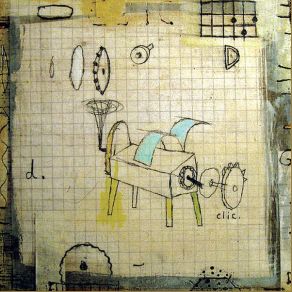Clic
Download links and information about Clic by Bernard Falaise. This album was released in 2007 and it belongs to Jazz, Rock, Alternative genres. It contains 13 tracks with total duration of 46:23 minutes.

|
|
|---|---|
| Artist: | Bernard Falaise |
| Release date: | 2007 |
| Genre: | Jazz, Rock, Alternative |
| Tracks: | 13 |
| Duration: | 46:23 |
| Buy it NOW at: | |
| Buy on iTunes $9.99 | |
Tracks
[Edit]| No. | Title | Length |
|---|---|---|
| 1. | Allô | 0:55 |
| 2. | Tricheur | 3:25 |
| 3. | Watt | 1:01 |
| 4. | Thon | 4:20 |
| 5. | Lime | 2:38 |
| 6. | Tour | 4:57 |
| 7. | Mule | 4:10 |
| 8. | Yéti | 5:16 |
| 9. | Fête | 3:24 |
| 10. | Neuf | 7:36 |
| 11. | Luna | 3:09 |
| 12. | Moka | 3:34 |
| 13. | Clic | 1:58 |
Details
[Edit]Anyone aware of the Montreal avant-prog and musique actuelle scenes knows about guitarist Bernard Falaise — in addition to his comparatively high-profile gig with longstanding avant-proggers Miriodor, he has graced concert stages and recordings in practically every avant-gardist setting imaginable, as a member of the electro-acoustic free exploratory Klaxon Gueule, Claude St-Jean's contemporary jazz-rockish Les Projectionnistes, Pierre Labbé's chamber jazzish ensemble, the Jimmy Giuffre-inspired trio that recorded Joue Free, the two-guitarist/two-drummer Montreal-Vancouver tandem free improv quartet the Unexpected, and on and on. His first solo album, 2000's Do, garnered much critical acclaim — even described as "very close to a masterpiece" by AMG reviewer François Couture, which would seemingly set the bar quite high for the guitarist's next outing. Well, in December 2007 that next CD, Clic, arrived, revealing that Falaise was in no apparent danger of a sophomore slump. One might naturally expect a musician such as Falaise, who possesses killer chops along with utter mastery of electronic effects both live and in the studio, to use his solo efforts as an opportunity to cut loose with displays of the "guitar hero" variety, since he is such a team-playing collaborator in his other settings, placing the needs of the ensemble ahead of any egotistic shredder tendencies. But Do demonstrated his ability to multi-track his guitar and other instrumentation with an admirable lack of grandstanding, and Clic proceeds even further away from the guitar as focal point (although Falaise does rip out a few concise and compelling solos and steps into the spotlight occasionally, with his instrument sometimes so sonically disguised that you can't be sure it's a guitar). In fact, Clic immediately places Falaise in the absolute top tier of avant-prog composers and arrangers for diverse instrumentation, not to mention a master of studio-based wizardry. A reading of the personnel should tip the listener off even before the music (or, more accurately, digital clicks, sampled voice, and circus calliope) of brief leadoff track "Allô" emanates in curious fashion from the speakers: in addition to Falaise on guitars, bass, banjo, mandolin, keyboards, percussion, turntables, and "manipulations diverses," the musicians present include saxophonist/flutist Jean Derome, clarinetist Lori Freedman, trombonist Tom Walsh, trumpeter Gordon Allen, drummer/percussionist Jean Martin, and Julien Grégoire on marimba. This would be a phenomenal live band, but Falaise has stated that "most of this music would be near impossible to perform live," and in fact the musicians individually overdubbed their contributions.
The result is challenging, imaginative, playful, and accessible, and in a sense a perfect blend of the melodious yet complex music of Miriodor and the tightly arranged and scored side of musique actuelle, although there are improvisational interludes mixed into the compositional intricacies. Homages are many across the album's 13 tracks, starting with "Tricheur," an obvious tip of the hat to "A Modern Lesson," the Bo Diddley-meets-Henry Cow leadoff track on Aksak Maboul's classic Un Peu de l'Ame des Bandits from 1980. Falaise knows his Rock in Opposition, but also claims inspiration from the likes of Braxton, Beefheart, Nancarrow, and Stravinsky. There is uncanny depth in the music's many layers: a counter-rhythm of crisp percussives bursts in over a mesmerizing minimalist backdrop during "Lime"; the electronic and acoustic instruments of "Tour" dance in a delicate swirl, with melodies and solo snippets intertwining as the underlying harmonic foundation shifts and brings all the instruments along, the entire assemblage fitting together with the precision of a jigsaw puzzle as the overall energy level pumps up into higher levels of urgency. On the jazzier, funkier side, Allen gets a brief blowing opportunity and pumps out an angular unison line with the marimba over a chunky, driving rhythm on "Mule," and "Yeti" fully integrates Les Dangereux Zhoms' front line of Derome and Walsh into an arrangement whose tempos speeds up and slows down like a roller coaster plummeting madly downward, slowing to a crawl on the ascent and barely making it to the crest of the next rise before swiftly accelerating to the ground again. And so it goes throughout Clic: Falaise's impeccable chops and advanced guitar sonics (not to mention banjo and mandolin!) tumble into a universe where radio static, digital blips, and oddball vocal samples meet calliopes, glockenspiels, marimbas, and jazzed-up brass and reeds to create music with an ebb and flow as natural and organic as the movement of thoughts and emotions, ranging from whimsically fun to dramatic and even mysterious and darkly atmospheric. With his second album, Bernard Falaise has managed to marry the engaging qualities of Miriodor and L'Ensemble Rayé to the challenging aspects of Henry Cow, Blast, Stevan Kovacs Tickmayer, and Rich Woodson's Ellipsis (and sometimes you can even dance to it!). Clic is an astounding record — yes, even a masterpiece — and a strong candidate for 2007's avant-prog album of the year.